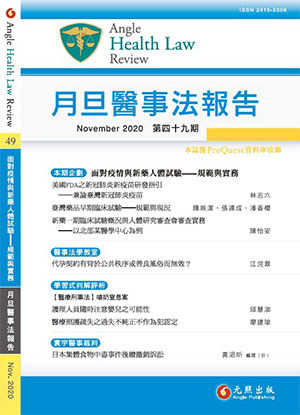臺灣病人自主權利法如何實踐於護理之家之探討【月旦時論】 試閱
Exploring How to Implement the Patient Autonomy Act in Nursing Homes in Taiwan
漸進式安寧緩和醫療理念已是臺灣醫護界共有的趨勢,其內涵為重視病人的自主意願,期許作出預立醫療決定的當事人能緩和、有尊嚴的走向生命終點,而不是成為家人情感或經濟的依賴。護理之家乃係現代高齡化社會的重要機構,其住民則是具有老化、慢性病、失能,逐步邁向生命終點的一群人,適用漸進式安寧緩和醫療理念,但現行的病人自主權利法,卻不足以因應住民們對病人自主權落實的需要,原因包括預立醫療決定作成的參與成員需求過高、護理之家人員配置不足、護理之家與醫療中心的空間差距、阻卻違法規範不足,導致預立醫療決定的把關人員,易於規避麻煩而拒為發動等。
資源分配現況下,護理之家無法配置所有專業科目的專科醫師。縱然住民有預立醫療決定,仍需由後送制度轉診至醫院治療或急救,住民長期歷經反覆的後送,肇生無效急救措施,加重住民身、心負擔,甚有家屬介入,使病人自主權的實踐更為困難,以致病人自主權利法的規範內容難以落實於護理之家住民。本文建議,立法上應增加能執行預立醫療決定的主體,及訴訟法上加以配套,將健保卡註記視為預立醫療決定合法成立且有效,以保護醫師。而且護理之家應有主動提供住民相關資訊的義務,使住民得以親近資訊,俾使護理之家住民之病人自主權獲得確保。
The concept of Progressive Hospice Palliative Care has become a common trend in the medical community in Taiwan’s aging society. It upholds the patients’ will, hoping Advance Decision makers could set off to the end of life with compassion and dignity rather than living for the family’s feelings or becoming an income source for their family. Nursing Homes are important institutions in the modern aging society. Their residents are a group of aging people with chronic diseases and disabilities, who are gradually moving towards the end of life. They apply to the concept of Progressive Hospice Palliative Care. However, the currently passed Patient Right to Autonomy Act is unsatisfactory to meet the needs of the nursing home residents for their patient autonomy realization. Reasons include high threshold for Advance Decision participants, short-staffed nursing homes, long distance between nursing homes and medical centers, and insufficient regulations on affirmative defenses, which results in the executors’ refusal to perform Advance Decisions in avoidance of trouble.
The present state of resource allocation in Taiwan restraints Nursing Homes from possessing specialists in all medical categories. Even after making Advance Decisions, nursing home residents will still be transferred to hospitals for treatment or first aid under the referral system. Going through long-term recurrent referrals, the inhabitants will inevitably face ineffective first aid measures, which intensifies their physical and psychological burden. Additionally, with the interference of family members, patient autonomy realization becomes more severe. Accordingly, the content of the Patient Right to Autonomy Act is unsuitable for the nursing home residents’ present condition and realization of their patient autonomy. This paper suggests that in legislation, limitation on eligible executors of Advance Decision should be eased; as for complementary measures on evidence, Marked Health Insurance Card should be seen as the proof of Advance Decision being legally established and effective, in order to protect medical practitioners. Moreover, nursing homes should be obligated to provide relevant information to the residents, enabling their easy access to the information. Only in this way can patient autonomy of the nursing home residents be ensured.
125-152






